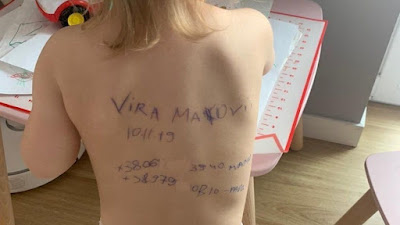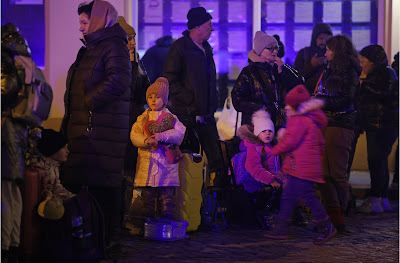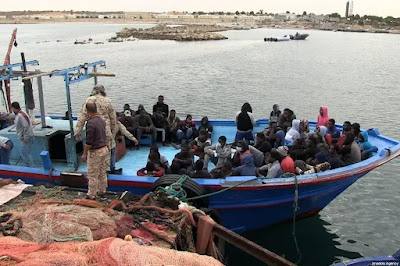I’m on my second of four cups of gunpowder
green tea and here’s a tweet from Zelenskyy:
now there’s Made With Bravery, an online shop
where anyone with a Visa card
can make a miniscule contribution to the war.
I don’t like to brag but if online shopping
were a competitive sport I could medal
in the cool stuff at a good price event, so let’s get to it:
vyshyvanka shirts—I could wear one of those.
Such a flattering cut, but the stitching sprouts all over.
Look at this men’s vyshyvanka. Simplicity
is elegance, right? No one to buy it for
but why should that stop me? The sleeves
would be too long and perhaps they’d snicker
at my cross-dressing. I don’t think I’d care
much about that but then there are folks
who would think culturally illiterate
and so many already think that goes with American
so I can’t buy one of those. T-shirts are okay but
I can’t wear yellow near my face and hey—
there’s an art category and that’s perfect.
I won’t have to worry about the size, but the shipping!
And international—better not think about it
or I’ll never get to the finish line.
That abstract painting with every shade
of pink and green and all those textures…
which I can always return to later. Scroll down to a riot
of flowers. I mean, a peaceful demonstration.
That word is used inappropriately so often. Crowded,
standing together. Reds and yellows and purples shout
over each other, but they have something substantial to say.
About joy, or the need to let all your color catapult
you into the next dimension and whatever shape that takes,
I could use reminding. Click and it’s Walk
Through Claude’s Gardens, and I believe it.
Those petals curl right off the canvas the oil is so thick
and wait, this is an oil painting, not a print?
I’ve never owned an oil painting. Maybe I can afford it—
yes, $247 is something I can do, especially for an original.
How big is 50*50 cm, anyway? Another tab to convert
centimeters to inches, 20x20, that’s a nice size
and I definitely love it. Have to have it.
Put in my address: why can’t Chrome translate
the countries in the dropdown list? I’ve seen США
so many times in the tweets but it would be a shame
if it got sent to the wrong country.
Google Translate says I was right
and I’d better be, after 6 ½ months
of keeping up with this war
that was supposedly never again,
and why won’t they let me specify my state?
I guess it could arrive with only the zip. I want it.
I put in my Visa number and the next screen
isn’t in dollars anymore but UAH.
Whoa, that’s a lot of digits
so another tab for a currency converter
and yes it’s right so I press Pay and it says
I still need to make the payment for my order.
At least they’re recognizing I have an order.
I call the number on the back of the card
and plug my other ear to hear the voice from India
say nothing was declined, nothing was purchased
today and they would know even if it was a minute ago
so I have to solve it through the site. I email
and ask if someone could have bought it
during the cup of tea between when I started
putting in my address and when I pressed Pay
and so could I commission a similar one
and I’d better get this taken care of soon
because if she sells her entire stock on the first day
it won’t be long before they’re four times the price.
Good for her, but I’ll be shut out
and there are so few occasions to join
this awful war from 4,500 miles away
and it’s not in my cart so I really hope
it’s being saved in cyberspace
while the customer service people wade
through the backlog including three emails
from me and that painting would
fill the beige void I get sucked into
for every virtual meeting
much better than this starting-to-get-long
black-and-white poem.
By now they’re all struggling to sleep
through air raid sirens because the Russian army
thinks they’re making gains when they lob
their missiles at apartment buildings, but those HIMARS
we sent have been really good at shooting
rockets out of the sky so maybe none will land near her
tonight and Kyiv is 7 hours ahead of Connecticut
so I hope when I wake
there will be more than the automatic reply from Bravery
waiting for me here in my inbox. Hold on—
how did this fraud alert slip in?
Yes, I recognize that purchase.
Why did it take eight hours
when the lady from the credit card company
said it would have shown up instantly?
Thank God I left the tab open
after I kept telling it to Pay
because I can’t find the painting on the site
anymore but they’re still trying to fingerprint my browser
from hours before so I reload and press Pay
and it doesn’t work the first time but
reload that sucker again and
Wahoo! I’m the new owner of actual art
and look I got it done before midnight
and wow she must have been just as frazzled
because it’s only 6:46 am there
and here’s the shipping label, all ready to go.
Tatyana Pchelnikova, you’re amazing.
I subscribed for updates because I have another
empty wall and you’ll be my go-to artist
even after the invaders
have had enough of their genocidal nonsense.
Becky DeVito is pleased to report subsequent purchases at Made With Bravery have gone much more smoothly, including the names of countries appearing in English in the dropdown list. Becky DeVito has used poetry as a means of working her way through trauma. Her experiences writing poetry led her to investigate the ways in which poets come to new insights through the process of drafting and revising their poems for her doctoral dissertation. She is a professor of psychology at the Capital campus of CT State Community College in Hartford, Connecticut. Her poems have been published in The Ekphrastic Review, Frogpond, Mobius: The Journal of Social Change, Naugatuck River Review, Ribbons: Tanka Society of America Journal, and others. Join her on Twitter, Facebook or Instagram.











